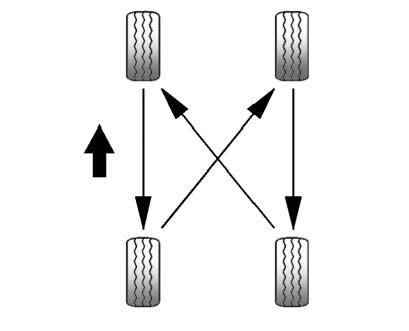Tire Rotation
Tires should be rotated every 12 000 km (7,500 mi). See Maintenance Schedule .
Tires are rotated to achieve a uniform wear for all tires. The first rotation is the most important.
Any time unusual wear is noticed, rotate the tires as soon as possible and check the wheel alignment. Also check for damaged tires or wheels. See When It Is Time for New Tires and Wheel Replacement .

Use this rotation pattern when rotating the tires.
Do not include the compact spare tire in the tire rotation.
Adjust the front and rear tires to the recommended inflation pressure on the Tire and Loading Information label after the tires have been rotated.
See Tire Pressure and Vehicle Load Limits .
Reset the Tire Pressure Monitor System. See Tire Pressure Monitor Operation .
Check that all wheel nuts are properly tightened. See“Wheel Nut Torque” under Capacities and Specifications .
![]() WARNING
WARNING
Rust or dirt on a wheel, or on the parts to which it is fastened, can make wheel nuts become loose after time. The wheel could come off and cause an accident. When changing a wheel, remove any rust or dirt from places where the wheel attaches to the vehicle.
In an emergency, a cloth or a paper towel can be used; however, use a scraper or wire brush later to remove all rust or dirt.
Lightly coat the center of the wheel hub with wheel bearing grease after a wheel change or tire rotation to prevent corrosion or rust build-up. Do not get grease on the flat wheel mounting surface or on the wheel nuts or bolts.
See also:
What Makes an Airbag Inflate?
In a deployment event, the sensing system sends an electrical signal triggering
a release of gas from the inflator. Gas from the inflator fills the airbag causing
the bag to break out of the cover ...
Engine Coolant (3.9L Engine)
The cooling system in the vehicle is filled with
DEX-COOL® engine coolant. This coolant is designed
to remain in the vehicle for five years or 150,000 miles
(240 000 km), whichever occurs first ...
Service Publications Ordering
Information
Service Manuals
Service Manuals have the diagnosis and repair
information on engines, transmission, axle suspension,
brakes, electrical, steering, body, etc.
Service Bulletins
Service Bulletins ...


